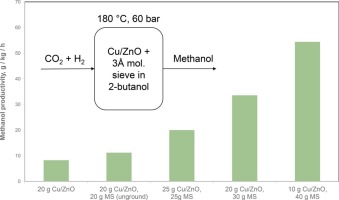Journal of CO2 Utilization ( IF 7.2 ) Pub Date : 2018-01-06 , DOI: 10.1016/j.jcou.2018.01.002 Harri Nieminen , Georgy Givirovskiy , Arto Laari , Tuomas Koiranen

|
Alcohol-promoted methanol synthesis uses heterogeneous methanol synthesis catalysts in alcoholic solvents where the alcohols act as a co-catalyst. In the presence of alcohol, the reaction proceeds through alcohol formate ester as an intermediate, allowing methanol synthesis at lower temperatures than conventional gas-phase synthesis. In the present work, alcohol-promoted CO2 hydrogenation to methanol was studied experimentally using a Cu/ZnO catalyst with 1-butanol and 2-butanol as solvents. As water is known to inhibit methanol synthesis on Cu/ZnO catalysts, the alcohol-promoted process was further developed by in-situ adsorption of water using a 3 Å molecular sieve. The methanol productivity significantly improved as a result of the lowered concentration of water. The concentration of water was thus identified as a key factor affecting the overall methanol productivity. As the alcohol-promoted methanol synthesis process is characterized by two separate reaction steps, the use of separate catalysts optimized for each step offers an interesting approach for the development of this process. Such a dual-catalysis concept was tested using a copper chromite catalyst together with Cu/ZnO. Promising results were obtained, as methanol productivity increased with the addition of copper chromite. Catalyst characterization was carried out using XRD and SEM-EDS and potential effects of observed changes in catalyst structure during reaction are discussed.
中文翻译:

酒精通过水和双重催化剂的吸附促进甲醇合成
醇促进的甲醇合成在醇溶剂中使用多相甲醇合成催化剂,其中醇充当助催化剂。在醇的存在下,反应通过作为中间体的甲酸酯醇进行,使得甲醇的合成温度低于常规气相合成法。在目前的工作中,酒精促进的CO 2使用1-丁醇和2-丁醇作为溶剂的Cu / ZnO催化剂,对加氢成甲醇进行了实验研究。由于已知水会抑制Cu / ZnO催化剂上的甲醇合成,因此通过使用3Å分子筛原位吸附水来进一步发展醇促进的方法。由于降低了水的浓度,甲醇的生产率显着提高。因此,水的浓度被确定为影响整体甲醇生产率的关键因素。由于醇促进的甲醇合成方法的特征在于两个独立的反应步骤,因此为每个步骤优化的单独催化剂的使用为该方法的开发提供了一种有趣的方法。使用亚铬酸铜催化剂与Cu / ZnO一起测试了这种双重催化概念。获得了有希望的结果,随着亚铬酸铜的添加,甲醇的生产率提高。使用XRD和SEM-EDS对催化剂进行了表征,并讨论了反应过程中观察到的催化剂结构变化的潜在影响。











































 京公网安备 11010802027423号
京公网安备 11010802027423号